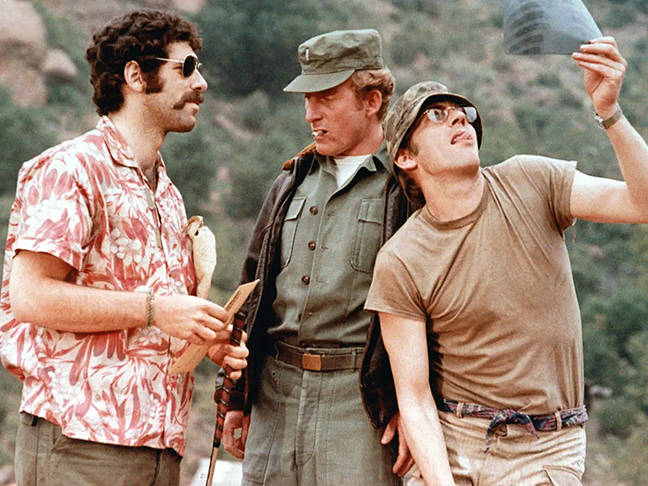Welcome!

Robert Altman's 1970 movie “M*A*S*H” was much darker than the popular TV sitcom that followed.
Mr. Movie: Robert Altman
Robert Altman died at 81, about six months after they finally gave him an Oscar (honorary, at that) after five fruitless Best Director nominations.
Like most great artists, Altman always went his own way, taking risks and being willing to fail. But when he scored, he left deep marks on cinematic history.
M*A*S*H (1970) is uproariously funny, and is much darker than the TV sitcom it sired. Elliott Gould, Sally Kellerman, Donald Sutherland, Tom Skerritt and Robert Duvall lead a fine cast composing a medical unit in Korea. The episodic screenplay by Ring Lardner, Jr. won the Oscar. In this landmark film, Altman pushed way beyond the edge of the envelope and changed comedy forever.
Altman’s brilliant snapshot of America in Nashville (1975) is unlike anything before or since. It’s a crazy quilt of seemingly unrelated incidents, with a great ensemble cast (Keith Carradine, Henry Gibson, Karen Black, Geraldine Chaplin, Lily Tomlin), which somehow coalesce into a picture of how we were and how we are. A combination political rally and country music show is the backdrop.
Actors pushed and shoved for the chance to be in an Altman film, regardless of their usual asking prices. Another fine cast (Carol Burnett, Paul Dooley, Mia Farrow, Lillian Gish) carries A Wedding (1978) well past the usual Hollywood treatment of the rite of marriage. Altman comes at weddings and families from new and untried angles and winds up with a film unlike any other on this familiar subject.
Hollywood itself is the subject, or target, of The Player (1992). Hollywood ethics, an oxymoron if there ever was one, are poked and pushed unmercifully in this very hard-edged comedy. Tim Robbins is the ultimate, and literal, back-stabber whose sole aim is his own advancement. There are dozens of cameos of well-known stars, which adds to the enjoyment.
Brewster McCloud (1970) is about a boy who lives in a bomb shelter under the Astrodome, and whose goal in life is to fly under the dome. There are a series of unsolved murders in the Houston area, and the evidence points toward the wannabe flyer. As the cops close in, the boy finally realizes his dream to fly. Bud Cort plays the boy, and is ably backed by Sally Kellerman and Shelly Duvall.
The Gingerbread Man (1997) with Kenneth Branagh is a fairly standard good-lawyer-in-a-jam movie, and Cookie’s Fortune (1999) is a very accessible black comedy about the importance of propriety in a Southern family.
Some other Altman films worth a look include McCabe and Mrs. Miller (1971) with Warren Beatty and Julie Christie in the most unconventional of Westerns; Gosford Park (2001), Altman’s original take on a British manor whodunit; and Prairie Home Companion (2006), a fine tribute to the long-running NPR Garrison Keilor show.
All of the movies in this column are for adults.
